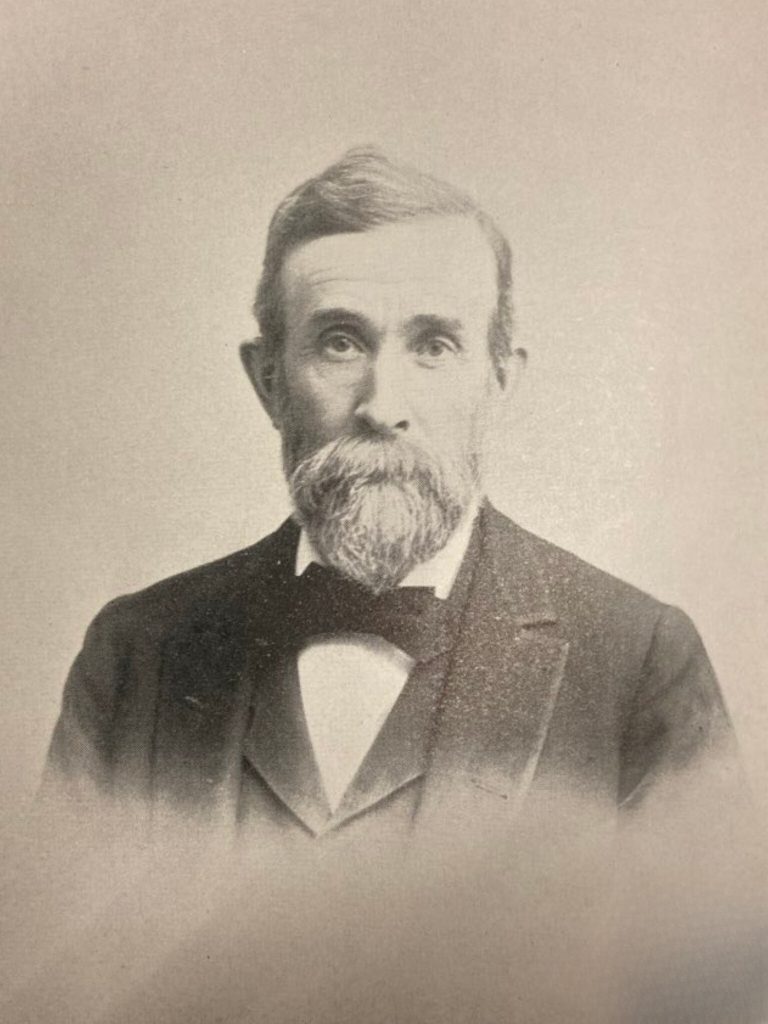 In 1808, Josiah Bean and his wife Dolly Dearborn came to the newly formed Cortland County from Candia, New Hampshire and settled in Solon. They located to land on what is now Syrian Hill Road. When the Bean family migrated to Solon, they had seven children in tow. Son Jeremiah (child number eight) is listed as being born in Candia on September 30, 1808, so they must have arrived sometime after that. Traveling hundreds of miles over primitive roads (probably by oxcart) with many children, including their newborn, in the late fall or early winter would not have been an easy journey. Was there some kind of cabin already there on the land, or did the family have to rough it in the woods through their first winter here? Josiah and Dolly would have an additional eight children in Solon, and daughter Sally was the first child born to them in their new home on December 29, 1809. Josiah was remembered as an active member of the community, and he and Dolly remained on the family farm in Solon until their deaths.
In 1808, Josiah Bean and his wife Dolly Dearborn came to the newly formed Cortland County from Candia, New Hampshire and settled in Solon. They located to land on what is now Syrian Hill Road. When the Bean family migrated to Solon, they had seven children in tow. Son Jeremiah (child number eight) is listed as being born in Candia on September 30, 1808, so they must have arrived sometime after that. Traveling hundreds of miles over primitive roads (probably by oxcart) with many children, including their newborn, in the late fall or early winter would not have been an easy journey. Was there some kind of cabin already there on the land, or did the family have to rough it in the woods through their first winter here? Josiah and Dolly would have an additional eight children in Solon, and daughter Sally was the first child born to them in their new home on December 29, 1809. Josiah was remembered as an active member of the community, and he and Dolly remained on the family farm in Solon until their deaths.Samuel Bean was the sixth child of the family, and he was the second Samuel. Josiah and Dolly’s first child was named Samuel and he died in infancy. It was a customary practice to reuse the name of a deceased child, and that is what they eventually did. Samuel was brought up on the family farm in Solon where he worked and lived until he bought his own farm in the town of Homer. He married Anna Austin, and the couple had four children. Samuel was never involved in politics, but he was supportive of improvements for the sake of the community, and he was generous with his financial contributions that supported public enterprises.
Born on February 6, 1834, Samuel and Anna Bean’s son William A. was their second child, and he was born on their farm in Homer. William A. Bean received a good education at the Cortlandville Academy. When he was 23, he married Emma McConnell from Sempronius. William and Emma had six children; William Jay, Arthur R., Henry Phelps, Jennie Augusta, Mariam Lawton, and an infant daughter who died the same day she was born. Jenny and Mariam both died in childhood from diphtheria. Sadly, William and Emma would outlive all their children but one.
They farmed in Homer, but in 1887, William and Emma moved from the town to the village so William could establish a manufacturing enterprise called the Cortland Oil Cloth Company. The company made oil carpeting which was used extensively in the wholesale carriage manufacturing business in the United States. This carpeting was especially good for carriages and sleighs, and due to the demand for his product, William’s shop always kept four to six employees. The factory kept him busy, and his son Henry was also involved in the business as the superintendent of the factory. Despite his successful business, William continued to farm his land, but his son William J. tended to it. Son Arthur moved to Binghamton where he later died in 1895 after an attack of the grip (an old term for influenza) which was followed by quinsy—a complication from tonsillitis.
Henry P. Bean moved to Belhoit, Michigan around 1901 with his own family, and on November 19, 1903, he succumbed to injuries sustained from a fall while painting a house. His parents had just been in Belhoit to see Henry two weeks before, and William caught a train and rushed to his son’s side. William arrived in time to say his goodbyes to his fifth child who preceded him to the grave. Henry left behind a wife and four young children.
By 1903, William and Emma had buried all their children but William J. It was August 30, 1904, and William had hired someone to repair the roof on their village house on Cortland Street. Later that day, William went out on the roof to paint the new wood, but he fell off the roof to the sidewalk below. He was carried inside and never regained consciousness. Three physicians were called, including Dr. Leman W. Potter, whom we have learned about in a previous article. The diagnosis was that William had fractured his skull at the base of his brain, and death occurred just a few hours later. It had not even been a year since Henry’s death from a fall; the family must have been paralyzed with grief.
In death, William was remembered as having been kind, patient, and industrious, and those qualities provided joy and inspiration to those who knew him. He became a member of the Congregational Church in Homer in 1853 and remained so until his death. He had been the Sunday school superintendent for years, and at the time of his death, he was a class teacher. William’s obituary said his faith helped him bear the trials of his life. In addition to his commitment to his church, William was an active member of the East Homer grange. And like both his father and grandfather, William was interested in the welfare of his community.
Emma was spared the grief of losing her last child. She died on May 30, 1916, and William J. did not die until 1918. Despite spending their lives in Homer, this branch of the Bean family opted for burial at the Cortland Rural Cemetery. ~By Tabitha Scoville, CCHS Director
